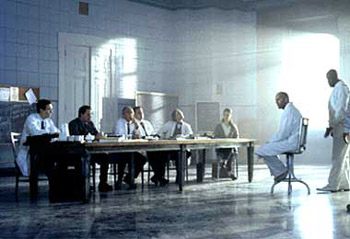 |
October 1, 2008 (Bloomberg News)
Former U.S. Treasury Secretary Paul O'Neill said the $700 billion bank-rescue proposal under negotiation in Washington is "crazy," with potentially "awful" consequences for the world's largest economy.
"Doesn't this seem like lunacy to you?" said O'Neill, who was President George W. Bush's first Treasury chief, from 2001 to 2002, in a telephone interview today. "The consequences of it are unbelievably bad in terms of public intrusion into the private sector."
O'Neill's objections mirror those of Republicans in the House of Representatives who rejected the plan in a Sept. 29 vote. The former Treasury chief said he's lobbying for an alternative solution that would offer guarantees for troubled assets, stopping short of purchasing the debt.
"Is anybody thinking there?" asked O'Neill, who also served as deputy budget director in the Ford administration. "It's too late, it's not going to make any difference, and it's aggravating as hell when there's a better idea and you can't even get it in play," he said, recognizing little success so far in pitching his own proposal.
O'Neill, 72, was fired after an almost two-year tenure marked by strains with White House officials and comments that roiled markets.
'Just Like Cash'
His plan to deal with the crisis would start with a "discounted cash-flow analysis" of distressed instruments that are clogging the financial system. The government would guarantee the assets, paring back the support as principal and interest payments were made, he said.
"That should take care of the liquidity problem because if they have a government guarantee at a specified level they should trade just like cash," O'Neill said.
He likened his solution to the Treasury's decision Sept. 19 to guarantee domestic money-market funds for a year to try to stop a run on what traditionally have been among the safest of investments.
To replenish capital in banks, the government should make 20-year loans to institutions and charge 2 percentage points above the government's borrowing rate, he said. Regulators could count the loans as part of the banks' capital base, he added. Paying the premium would give banks an incentive to retire the government loans faster, he said.
O'Neill said he has tried to shop his ideas to congressional leaders including Joint Economic Committee Chairman Charles Schumer; Senate Banking Committee Chairman Christopher Dodd; and Senator Richard Shelby, the ranking Republican on the Banking Committee.
Senate Vote
"None of them are returning phone calls," O'Neill said. "I honestly don't think they really understand it and they're so much in a bubble that it's impossible to penetrate it."
"If they pass this thing, it's awful what the consequences are going to be in terms of an ongoing federal relationship that doesn't need to exist with the institutions," O'Neill said. "Are we going to insist on having a federal representative on boards of directors to protect our investment?"
"We have no capacity in the federal government and it's not possible to create a capacity to manage a $700 billion property portfolio," said O'Neill, who was chairman of Alcoa Inc., the largest U.S. aluminum producer, from 1987 to 2000. "It's crazy. It's like we've lost our moorings." more...
AntiSpin: "Is anybody thinking there?" Is that a rhetorical question? Of course they're not thinking. They're the US Congress. So now we get the worst of both worlds. Government interference in markets and a Depression because this plan can't possibly work. We like the King plan. It gets money into the hands of small businesses.
This is a taste of how our Congress will cope with the foreign debt bill coming due. In fact, these machinations are related. In lieu of treasury or agency bonds our investment banks decided they'd sell China, Japan, and Russia instead. In th event we wind up selling them treasury bonds anyway.
As, pent in an aquarium, the troutlet
Swims round and round his tank to find an outlet,
Pressing his nose against the glass that holds him,
Nor ever sees the prison that enfolds him;
So the poor debtor, seeing naught around him,
Yet feels the narrow limits that impound him,
Grieves at his debt and studies to evade it,
And finds at last he might as well have paid it.
- Barlow S. Vode
Swims round and round his tank to find an outlet,
Pressing his nose against the glass that holds him,
Nor ever sees the prison that enfolds him;
So the poor debtor, seeing naught around him,
Yet feels the narrow limits that impound him,
Grieves at his debt and studies to evade it,
And finds at last he might as well have paid it.
- Barlow S. Vode
__________________________________________________
To receive the iTulip Newsletter or iTulip Alerts, Join our FREE Email Mailing List
Copyright © iTulip, Inc. 1998 - 2007 All Rights Reserved
All information provided "as is" for informational purposes only, not intended for trading purposes or advice. Nothing appearing on this website should be considered a recommendation to buy or to sell any security or related financial instrument. iTulip, Inc. is not liable for any informational errors, incompleteness, or delays, or for any actions taken in reliance on information contained herein. Full Disclaimer
Comment